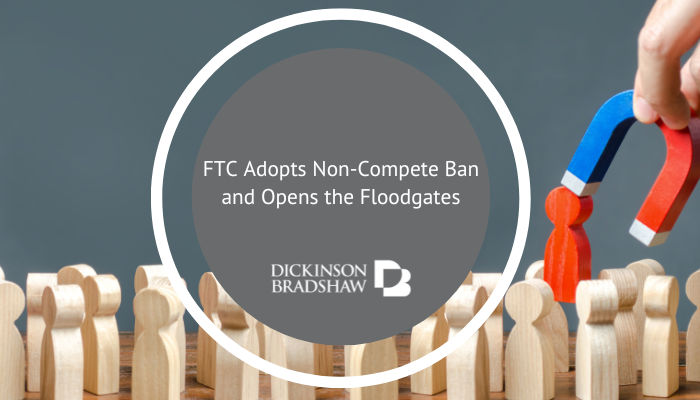FTC Adopts Non-Compete Ban and Opens the Floodgates

Posted on 04/25/2024 at 11:00 AM by Nicole Proesch
Voting 3-2, along party lines, the U.S. Federal Trade Commission adopted a final rule on April 23, 2024, that will ban many non-compete clauses and other restrictive covenants between private businesses and their employees and independent contractors. The rule is scheduled to take effect 120 days from its publication in the Federal Register. We estimate the effective date will be around August 24, 2024.
The new rule opens the floodgates for workers to move to competitors of their employers. The FTC estimates this rule could impact as many as 30 million people in the workforce – nearly one in five Americans. The FTC estimated the ban would create increased earnings for workers of at least $400 billion over the next 10 years. In Iowa alone the FTC estimated annual increased earnings for workers of $624 million.
Unfortunately, the rule hamstrings the ability of businesses to protect investments in trade secrets, confidential and proprietary business information, and customer and employee relationships. Because of this, various employer groups, including the U.S. Chambers of Commerce, the nation’s largest business lobby, has already filed a lawsuit challenging the rule.
Broad Definitions
“Non-compete clause” is defined in the new rule as a term or condition of employment where the employer prohibits, penalizes, or prevents a worker from either seeking or accepting work with a different person/company in the U.S. after the end of employment, or operating a business in the U.S. after the end of employment. While non-solicitation and non-disclosure agreements are not expressly named in this definition, they could be considered to fall within this definition if they prevent a worker from seeking or accepting work elsewhere.
“Workers” also are defined very broadly under this rule. They include paid or unpaid independent contractors, externs, interns, volunteers, apprentices, and sole proprietors, in addition to employees.
As you can see, these broad definitions of two key terms mean this new FTC rule will reach further than it seems at first blush.
Prohibitions
Under the new rule, employers are prohibited from the following:
-
Entering into or attempting to enter into a non-compete clause with a worker.
-
Enforcing or attempting to enforce a non-compete clause against a worker.
Exception: Employers may enforce or attempt to enforce non-compete clauses against senior executives if the non-compete clause predates the effective date of the rule. -
Representing that a worker is subject to a non-compete clause.
Exception: Employers may represent that “senior executives” are subject to non-compete clauses that predate the effective date of this rule.
Note: Prohibited representations include those made to workers, as well as to a worker’s prospective or new employer.
The two exceptions listed above beg the question: Who is a senior executive? A “senior executive” is defined in this rule as a worker in a policy-making position that received total compensation of at least $151,164 in the preceding year or whose annualized compensation would have been at or above that level in a partial, final year of employment. Discretionary bonuses, the cost of benefits, and costs of board and lodging are not included in total annual compensation. “Policy-making authority” is formal authority with regard to policies that control significant aspects of the business (mere influence over policy making is not sufficient). Workers holding a “policy-making position” include the President, the CEO or equivalent, and officers with policy-making authority. “Officers” may include president, vice president, secretary, treasurer, CFO, and officers of subsidiaries or affiliated entities of a common enterprise—but officers must have policy-making authority.
Affirmative Notice Requirements/Safe Harbor
The new rule requires employers who have existing non-compete clauses with workers who are not senior executives to provide a “clear and conspicuous notice … that the non-compete will not, and cannot legally be, enforced against” them. Model language for the notices is provided in the rule, as shown here:
|
A new rule enforced by the Federal Trade Commission makes it unlawful for use to enforce a non-compete clause. As of [DATE EMPLOYER CHOOSES BUT NO LATER THAN EFFECTIVE DATE OF THE FINAL RULE], [EMPLOYER NAME] will not enforce any non-compete clause against you. This means that as of [DATE EMPLOYER CHOOSES BUT NO LATER THAN EFFECTIVE DATE OF THE FINAL RULE]:
The FTC’s new rule does not affect any other terms or conditions of your employment. For more information about this rule, visit [link to final rule Landing page]. Complete and accurate translations of this notice in certain languages other than English, including Spanish, Chinese, Arabic, Vietnamese, Tagalog, and Korean, are available at [URL on FTC’s website]. |
Providing the model notice gives the employer a safe harbor defense that it complied with its obligation to give notice of unenforceability of existing non-competes.
Notices can be delivered to workers in four ways: (1) on paper and delivered by hand, (2) text, (3) email (work or personal), or (4) mail. Employers would be wise to deliver notices in a manner that provides a return receipt, and should consider using more than one method of delivery, in order to have adequate proof of delivery. The employer is exempt from providing a former worker with notice if the employer does not have their street address, email address, or mobile phone number.
Exceptions
The new FTC rule contains three complete exceptions:
-
Bona Fide Sale of a Business: The rule does not apply to non-compete clauses entered into with owners of a business and as part of a bona fide sale of that business, or the sale of all or substantially all of that business entity’s operating assets.
-
Existing Cause of Action: The rule does not apply to causes of action related to a non-compete clause if they accrued before the effective date of the new rule.
-
Good Faith: The rule does not apply when e a person has a good-faith basis to believe the rule is inapplicable.
Action to Take
Employers should watch for news of a stay or striking down of this rule, while at the same time prepare to comply with it. Below are steps leading to compliance.
-
Consider entering into Non-Competes with Senior Executives. Employers have about four months to enter into enforceable non-compete clauses with senior executives to protect their businesses. Once the new rule goes into effect (estimated to be August 24, 2024), it will be too late to do so.
-
Locate and inventory all restrictive covenants. Non-compete clauses, as they are broadly defined by the FTC’s rule, can be hidden in all types of agreements, and often the agreements are not titled “Non-Compete Agreement.” Non-compete clauses can be found in employment agreements, independent contractor agreements, non-solicitation agreements, confidentiality agreements or NDAs (non-disclosure agreements), separation and severance agreements, training repayment agreements, executive benefit plans and agreements, forfeiture clauses, merger and acquisition documents, and many other types of legal documents. Include all non-compete clauses for both current and former workers in the inventory, even if the worker may fall into an exception. Initially, the inventory should include the worker’s name, the name of the document with the prohibited (or possibly prohibited) clause, the date the agreement was signed, the end date of the restriction (if applicable), and the worker’s date of termination (if applicable). Maintain copies of the agreements or link them to the inventory so you can easily access the actual language of the restriction. Consult with legal counsel on any agreements, clauses, or provisions where there is a question as to whether they would qualify as a “non-compete” under this rule.
-
Identify exceptions. In the inventory of non-compete clauses, employers should identify those persons who would qualify for an exception—meaning “senior executives,” owners with an existing non-compete from a bona fide sale of the business, and any worker with whom the employer has a known or active cause of action under an existing non-compete. Maintain copies of documents relied upon to make these decisions (such as job descriptions), or link them to the inventory, so proof for the decision is easily accessible. Consult with legal counsel to check your good faith basis for the identified exceptions.
-
Add contact information to the Inventory. Add all last known contact information of workers on the inventory who will need a Notice of unenforceability. Choose the method or methods you will use to deliver the Notices.
-
Prepare to generate and deliver Notices on or before the Effective Date of the rule.
-
Consider alternatives. Consult with legal counsel for alternatives to “non-competes” to protect the business.
The Dickinson Bradshaw Banking Law Section recently published a blog on the impacts of the new rule on banks and the banking industry. If you’re in the banking industry, the FTC does not have jurisdiction over banks – the FDIC does.
Categories: Employment & Labor Law, Nicole Proesch, Dickinson Bradshaw News
Questions, Contact us today.
The material, whether written or oral (including videos) that is posted on the various blogs of Dickinson Bradshaw is not intended, nor should it be construed or relied upon, as legal advice. The opinions expressed in the various blog posting are those of the individual author, they may not reflect the opinions of the firm. Your use of the Dickinson Bradshaw blog postings does NOT create an attorney-client relationship between you and Dickinson, Bradshaw, Fowler & Hagen, P.C. or any of its attorneys. If specific legal information is needed, please retain and consult with an attorney of your own selection.







